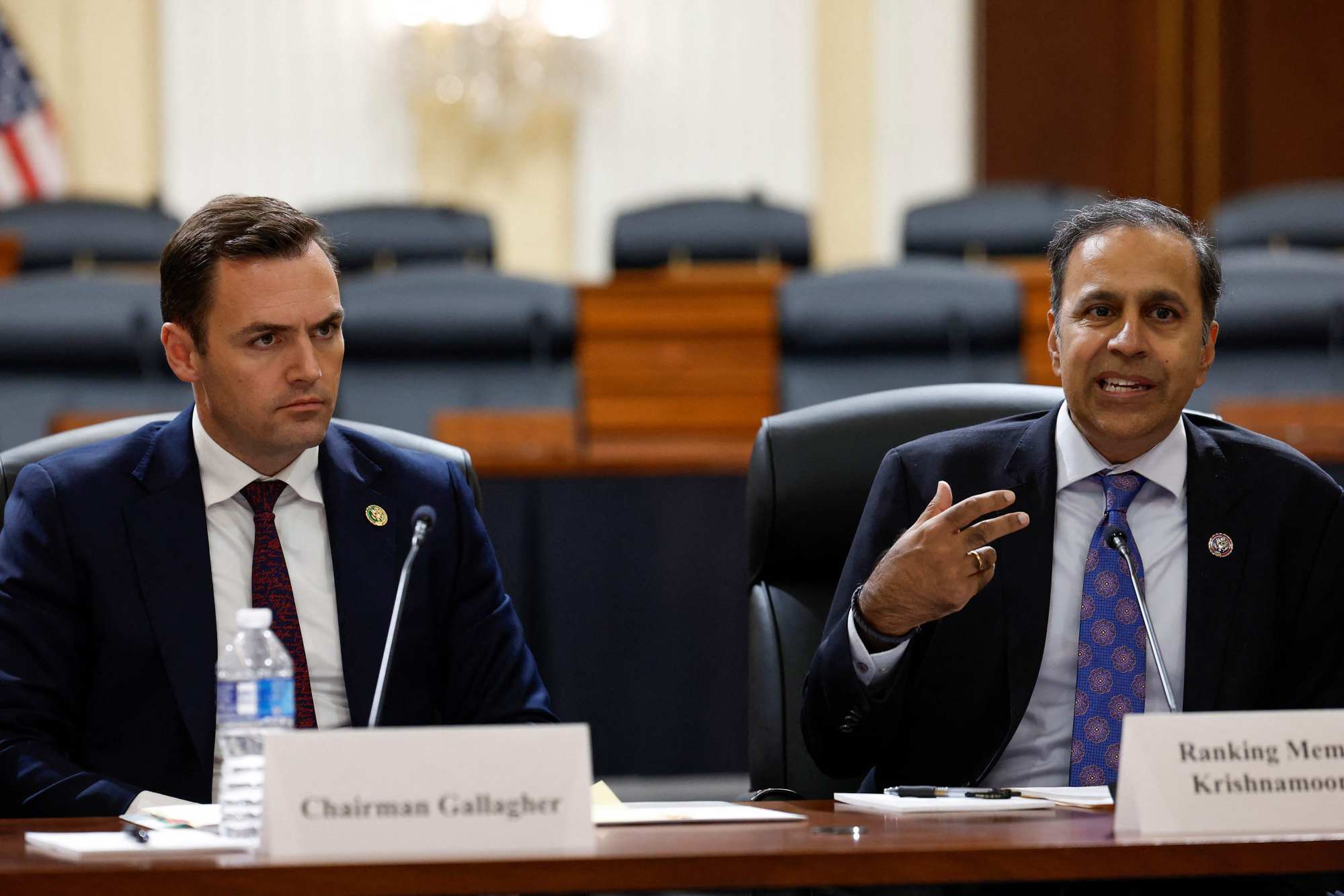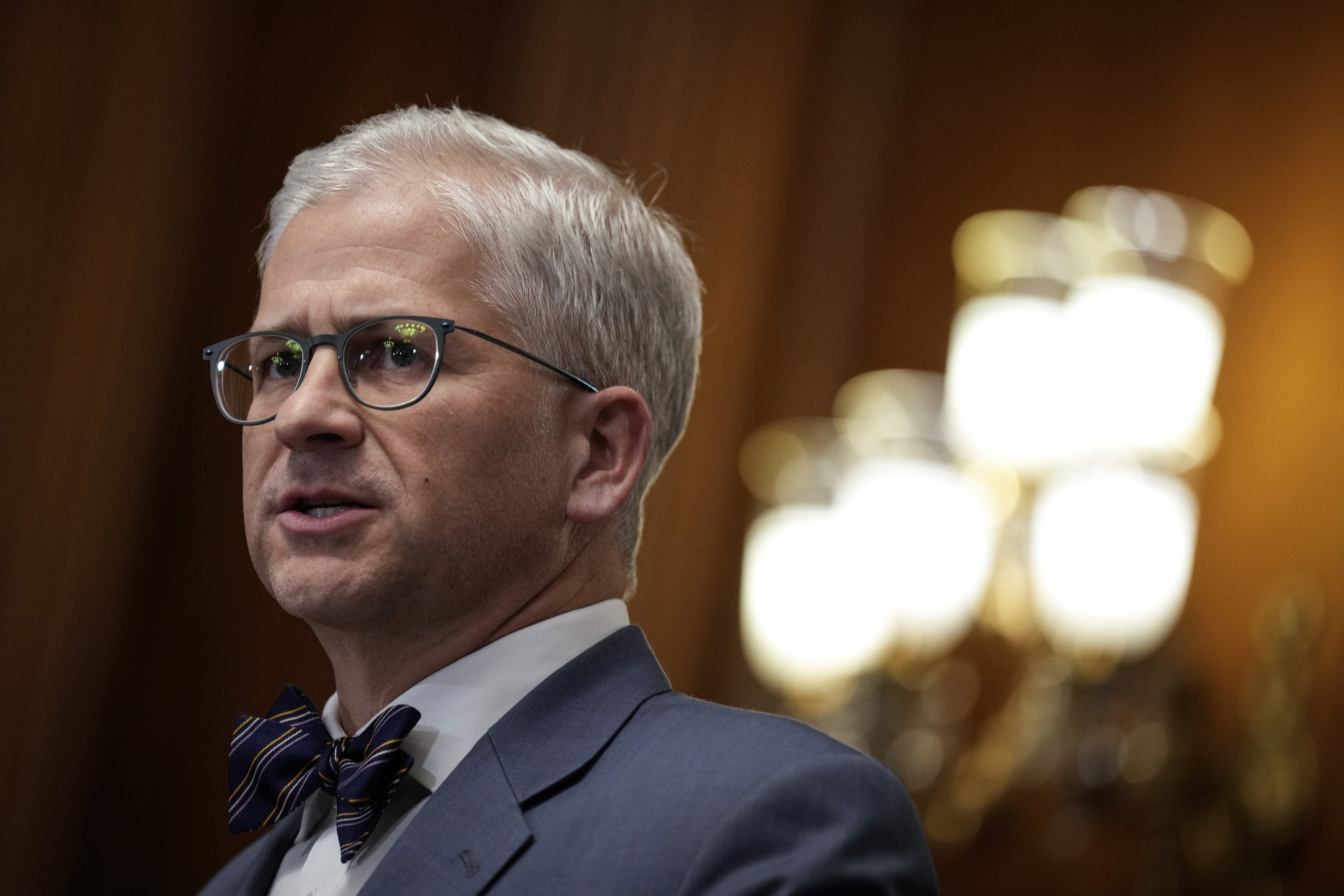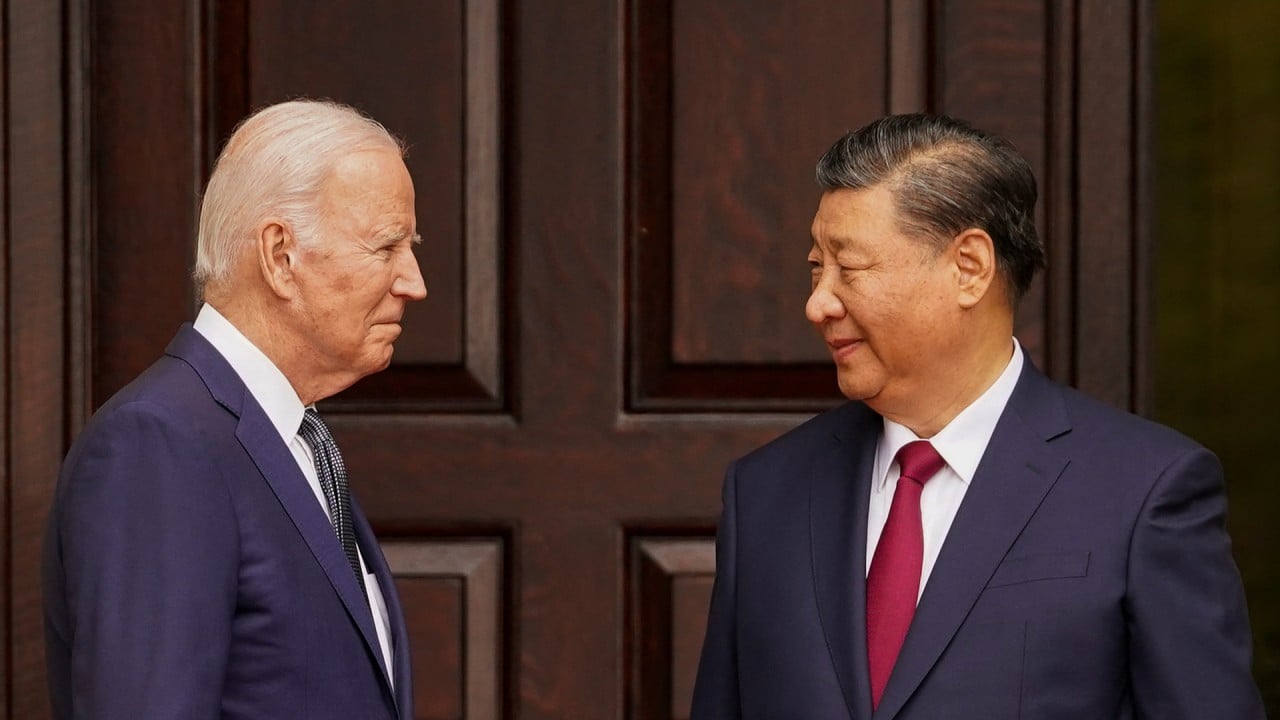
Consensus no more? Following Biden, Democrats start to split from Republicans on China policy
- Congressional Democrats adopt Biden’s pursuit of ‘de-risking, not decoupling’, while Republicans hold to more hawkish stances
- Some analysts say shift may open up more room for diverse views and policies on Capitol Hill
“Bipartisan consensus” is the catchphrase in Congress when it comes to US-China relations, but partisan differences have become increasingly visible as the two parties ramp up their campaigns for the 2024 elections.
Ahead of the meeting between US President Joe Biden and Chinese President Xi Jinping in California last month, Senator Chris Van Hollen, Democrat of Maryland, said at an event co-hosted by Foreign Policy magazine and the Quincy Institute of Responsible Statecraft: “Those who say we shouldn’t be talking to China, we shouldn’t be travelling to China, are taking the wrong path.”
And following the meeting, which occurred on the sidelines of the Asia-Pacific Economic Cooperation summit, over a dozen congressional Democrats released statements applauding Biden’s engagement efforts.
“President Biden’s decision to combine vigorous competition with sustained diplomacy is not just prudent, it is paying off for the American people,” said Representative Gregory Meeks, the senior Democrat on the House Foreign Affairs Committee, and Representative Ami Bera, the senior Democrat on its Indo-Pacific subcommittee.
Earlier in the year, Meeks wrote that while there is “bipartisan consensus that China is the United States’ central geostrategic challenge,” the US “cannot confuse hawkishness for strategy, or bluster for strength”.
The Democratic tone differs drastically from that of Republicans, and comes as the Biden administration has combined a return to high-level diplomacy with a continued embrace of export controls on advanced tech and Trump-era tariffs on China.
“De-risking, not decoupling” has become the Biden administration adage for managing its relationship with Beijing, and Congressional Democrats are increasingly falling in line publicly – a move that some analysts say may open up more room for diverse views and policies on Capitol Hill.
“The turns of diplomacy create an opening … to push the relationship in a different direction that could get us off the trajectory towards conflict,” said Jake Werner, the acting director of the East Asian programme at Quincy, which advocates for a more restrained US foreign policy.
But as senior Republicans continue to assail engagement and tough-on-China bills – including ones that would revoke China’s preferential trade status – sit in Congress, any momentum to sustain engagement is in question. Over US$750 billion in annual US-China trade, and direct US investment that has grown more than 10-fold over the past 20 years, stands at risk.
“The president has yet again undermined US national security interests and significantly narrowed the space for bipartisan cooperation on China,” Senator James Risch of Idaho, the senior Republican on the Senate Foreign Relations Committee, said of the Xi-Biden meeting.
Similarly, Republicans on the House select committee on China chose to temporarily discard the bipartisanship its chair Mike Gallagher had emphasised since the panel’s founding in January.
Ahead of the meeting, committee Republicans called it an example of “zombie engagement”, and issued a list of demands for Biden to raise with Xi. After it, Gallagher took to television to dismiss the bilateral efforts made on climate change cooperation.
For his part, the committee’s senior Democrat, Raja Krishnamoorthi, had called dialogue with China “invaluable” and said agreements from the meeting – which included resuming military-to-military talks and pledges from Beijing to crack down on Chinese producers of fentanyl precursors – were “encouraging potential steps forward”.

Democrats on the committee – the full name is Select Committee on the Strategic Competition Between the United States and the Chinese Communist Party – have generally pursued a more moderate, less ideologically driven line towards China.
Representative Andy Kim of New Jersey has advocated taking a multidimensional approach to China beyond pure national security concerns, and emphasised a more inward-looking approach to countering China, including fixing democracy domestically.
“What is it that the United States can do to strengthen itself?” he asked in October.
Other committee Democrats, like Ro Khanna of California, have championed a revitalised industrial policy as a key part of their messaging – in line with the Biden administration.
“We need to have a balance between a free market system but also strategic investment in critical industries to remain the pre-eminent nation in the 21st century,” Khanna said in July.
I freak out when other members start talking about ‘China is the enemy’, ‘China is an existential threat’ … that’s not the way the world’s going to work.
While Republicans haven’t rejected a focus on competing economically with China, they have taken a less active stance on stimulating strategic industries at home.
Most, including all Republicans on the select committee, voted against the Democratic-promoted Chips and Science Act of 2022 – which incentivises domestic production of advanced semiconductors, a key to the Biden administration’s China strategy.
For the most part, Krishnamoorthi has tried to maintain a bipartisan line, joining Gallagher on numerous efforts like investigating Chinese hi-tech investments, supporting Taiwan’s defence, and condemning China’s human rights record. However, he has also increasingly promoted issues Republicans have largely avoided.
In a speech last month at the Johns Hopkins University’s School of Advanced International Studies, Krishnamoorthi highlighted the need to fix the “broken” US immigration system as a pillar of outpacing China.
“We cannot out-compete the CCP unless more of the world’s best and brightest and most hardworking people come to this country and stay here,” he said.

Krishnamoorthi also highlighted the importance of combatting anti-Asian hate spurred by anti-China rhetoric and advocated for people-to-people-ties, including by reinstating the Fulbright programme in China, which was terminated in 2020 by then-president Donald Trump.
Other congressional Democrats who have rarely shied away from criticising China have recently taken a more moderate tone as well.
At the Foreign Policy-Quincy event, Representative Adam Smith of Washington, the House Armed Services Committee’s senior Democrat, said the US must maintain opportunities for partnerships with China, while seeking a rebalancing of the past two decades.
“When you look at problems we face, one of the largest economies in the world can be a positive part of that,” he said.
“I freak out when other members start talking about ‘China is the enemy’, ‘China is an existential threat’ … that’s not the way the world’s going to work. It’s more complicated than that.”
At the same event, Van Hollen, a member of the Senate Foreign Relations Committee who has sponsored numerous bills and resolutions to counter Beijing, said that while depending less on China for strategic sectors was important, he was firmly against decoupling.
This includes highlighting issues like Confucius Institutes, visa restrictions for Chinese students in the US, the purchase of American land by Chinese companies and security risks posed by the Chinese-owned video platform TikTok.
Evan Medeiros, a professor at Georgetown University and former White House adviser on Asia, said that any convergence or divergence between the two parties may be as much driven by the pursuit of domestic partisan agendas as they are by competing with China.
“Many legislators’ policy choices on China are not just about strategic concerns but are increasingly about instrumental political advantage and advancing their political priorities,” he wrote last week.
Werner of the Quincy Institute noted that the Republican maximalist positions were partly a reflection of being out of power: “Partisan-inspired condemnations will tend to be sweeping and say everything that the other side is doing is wrong.”
“When they get into power, they follow a much more nuanced or complex approach.”
But even before the 2024 elections, these tonal shifts may impact Congress’s work, which since 2018 has seen a dramatic rise in bills and resolutions on China and bipartisan passage of such legislation.
Christopher Chivvis, director of the American Statecraft programme at the Carnegie Endowment for International Peace, flagged the October visit to China by Charles Schumer, the Senate majority leader, as an important indication of changing attitudes, at least by Democrats.
“It does indicate a willingness to steer the tenor of the discussion in a somewhat different direction than it has been going over the course of the last five years,” he said of the bipartisan trip – the first congressional delegation to mainland China since 2019.
But Chivvis said it remained too early to analyse the extent of this shift and where the shift might lead, noting also some intraparty divisions that may come into play.

For now, Chivvis noted that Capitol Hill’s China moderates must still contend with an institution that leans towards a more aggressive approach towards Beijing.
“There’s a lot of negotiation at staff level over some of these issues, even where there appears to be consensus,” he said. But “what it comes down to … is an effort to water down more hawkish pieces of legislation”.
“They’re always on the back foot,” he said.


